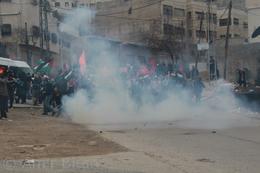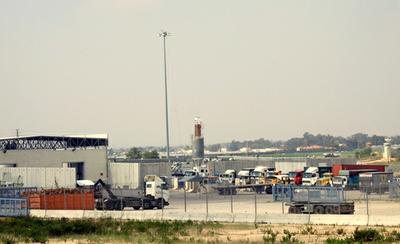
In the occupied territories people are divided into two groups – masters and natives. The masters in the settlements have a certain law, Israeli, and they are subject to Israeli courts – outside of Israel. They are an enclave floating over the occupied West Bank. So what happens when the Palestinian natives work for the masters in the settlements? Ostensibly, Israeli labor laws – such as they are – should apply to them: they must pay the minimum wage and respect some rights. But the employing masters in the settlements don't want that: a native is a native, and his price – the price of a native. 90 NIS (=$25) a day, 120 NIS ($34) a day: that's how much is paid for hard work in the Solor gas industries factory.
And the natives work. They work with hazardous materials – they work with bromide but without gas masks; in the paint department they work without ventilation and with deafening noise – and they pay for this with serious damage to their health. All this has been documented by our friends in "Kav L'Oved" who have been accompanying the worker's struggles for their rights here and in other settlements in the West Bank for years. On October 19, 2010, the workers went on strike.
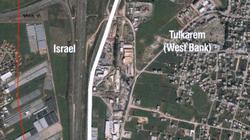
Solor gas industries factory is located in the industrial park Nitzanei Shalom ("Seeds of Peace" or "Buds of Peace"). The location is adjacent to the Separation Fence on the east, such that an additional fence divides it from the city of Tulkarem. The compound is closed-in between the fence and Tuk-Karem. A perfect location.
The Solor factory is not alone. The Dutch journalist Simone Kurkus had already reported three years ago on the reprehensible working conditions in factories in the "Seeds of Peace" industrial park. This is how it looks in the "Tal-El" collection and ecycling plant (read about it in the black list of "Who Profits"):
"It's better than not working at all," says Muhammed, 35, about his job in the "Tal-El Collection and Recycling Ltd." factory. He is the father of five; working six days a week, nine hours a day, for a salary of 11 NIS per hour – seven NIS below the minimum wage in Israel then. He feels that he is fortunate. According to him, he is privileged: he can feed his family and send his children to school.
But he is often paralyzed with fear. If he is sick, or late for work, or asks for a raise, his employers will fire him. It has already happened in the past. Workers that were late were punished by not being given work or wages for at least a week. The rebels, the sick, the weak, are fired on the spot. "The boss can find ten thousand others to replace me instantly," he explains. Because of that, every morning he leaves his house before 5:00 AM, doesn't demand minimum wage, works when he is sick and even during Id-al-Adha (Festival of Sacrifice). He has never taken a day off.
Now, you might say: injurious employment – that's alright, we have that in Israel, too! But you must admit that the occupation is a great improvement; it allows the bosses to escape the limited labor laws that do exist in Israel. How lucky are Israeli capitalists to have such a comfortable backyard in the West Bank!
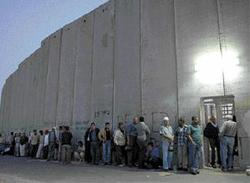
But the Separation Fence is a real find for smart investors. Not only does it deprive thousands of Palestinians of their livelihood, it is also the stick that prods them into working for starvation wages. It has also provided the conditions for the creation of an ex-territorial enclave outside of Israel. And of course, because the Fence is all about security, the investments and the infrastructure are wonderfully secure at the state's expense. That is what the army is for. The industrial park compound has an entrance from the west for Israelis, and an entrance from the east for the Palestinian workers. A genuine enclave – neither within Israel nor the West Bank.
It's called colonial capitalism: its infrastructure – fences, roadblocks, fortifications, army – are supplied by the state, and the land on which it is situated is an enclave under the control of the occupying force - but outside the law. The natives who work there go through a speeded-up process of integration into piggish capitalism – they lose their own means of production (their lands), they are cut off from their former workplaces (by fences and roadblocks), and now, desperate to make a living, they become a good work force: proletarians that work for the masters – the investors. The roadblocks are not only a issue of human rights. The roadblocks and the separation fence are also an instrument of submission and discipline – manufacturing manpower; they are part of the economic infrastructure of colonial capitalism.
Are we saying this? In 2007 a representative of the Palestinian Authority's Labor Ministry also said so, quite plainly:
The building the separation fence has made Nitzanei Shalom, the settlements and the rest of the factories near the fence more attractive to Israeli businessmen, according to Shahiye Yakub, representative of the Palestinian Authority's Labor Ministry in Tulkarem.
On one hand, the building of the Fence has worsened the already chronic problem of unemployment among the Palestinians. 150,000 Palestinians who had worked legally or not in Israel before 2000 can no longer go there, and tens of thousands of peasants have been cut off from their lands by the wall. Today, on any single day, on the average only ten thousand workers can go into Israel, depending on the security situation.
Because of this, cheap Palestinian workforce is growing. These people are desperate and willing to take any job at practically any price. And on the other hand, the Israeli factories feel confident near the separation fence because of the high level of security."
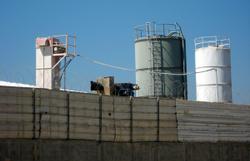
This is how Seeds of Peace "Industrial Park" looks like from behind the Wall, from Tulkarem. In 2009 factory production reached half a billion NIS.
Final question: what do you call – in Hebrew, in Arabic, or in any other language – an enclosed compound, guarded by armed forces, in which the workers enter by way of a special entrance in its walled fortications in order to work for starvation wages?
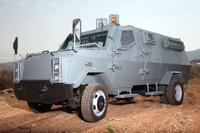
- One more thing: the Solor factory belongs to the "Solor Group", which is active in many areas – not just containers for fuel and gas, and water pipes. There are many. There are many other good things: the "Solor Group", at whose head is the businessman David Oron, has a subsidiary – "Hetehof" or "Hatehof" – which "develops and manufactures special-purpose vehicles for military and civilian purposes, armored vehicles, aviation fueling, rapid-response vehicles, riot-control vehicles fire trucks and other emergency vehicles."
- And one final thing: Solor Group is going into the organic bread business. They will be manufacturing the organic bread for Teva-Market chain store. What, you wouldn't boycott it?
Don't miss the excellent documentary film on exploitation in the Israeli industrial zones located in the West Bank:

